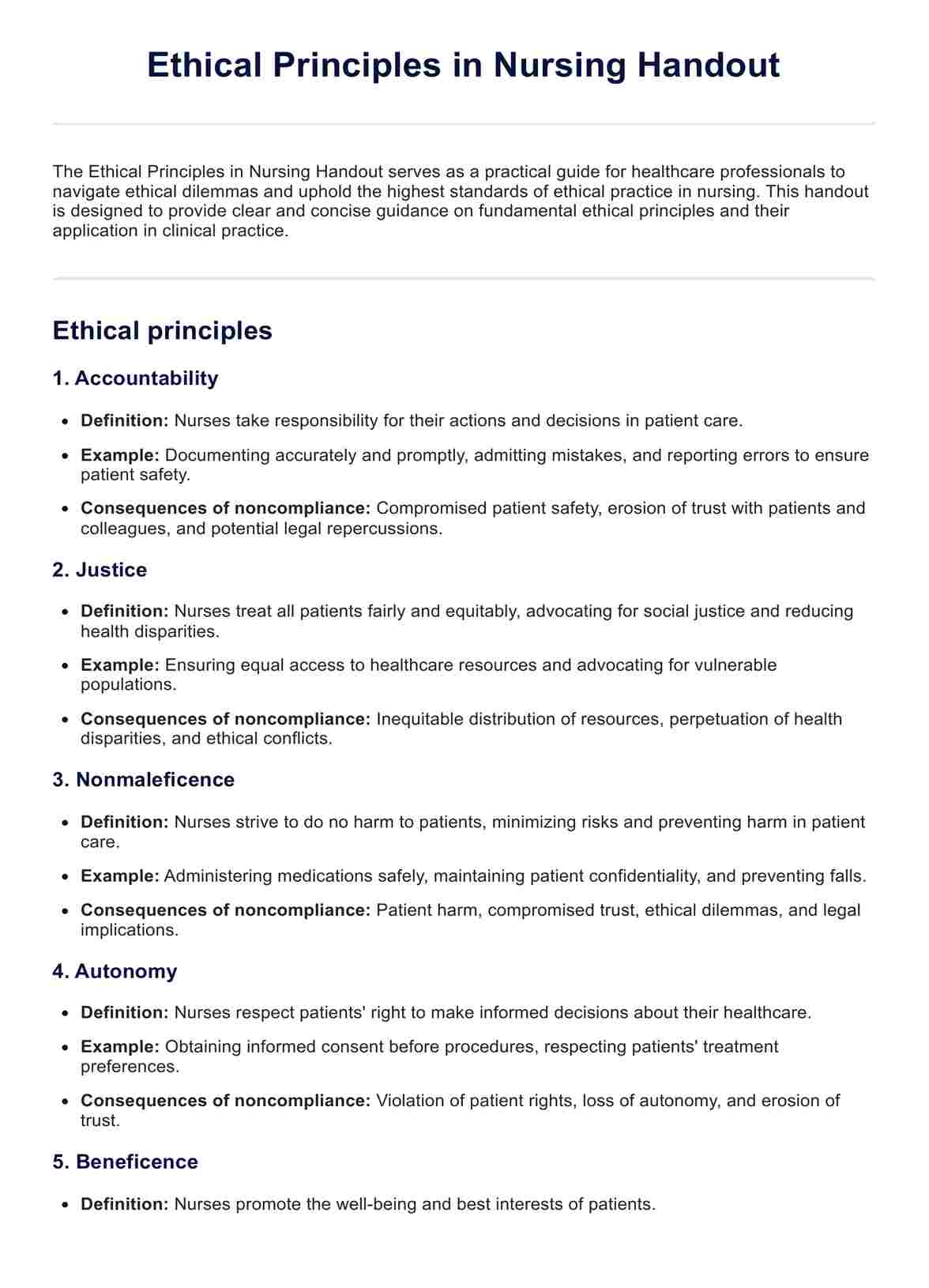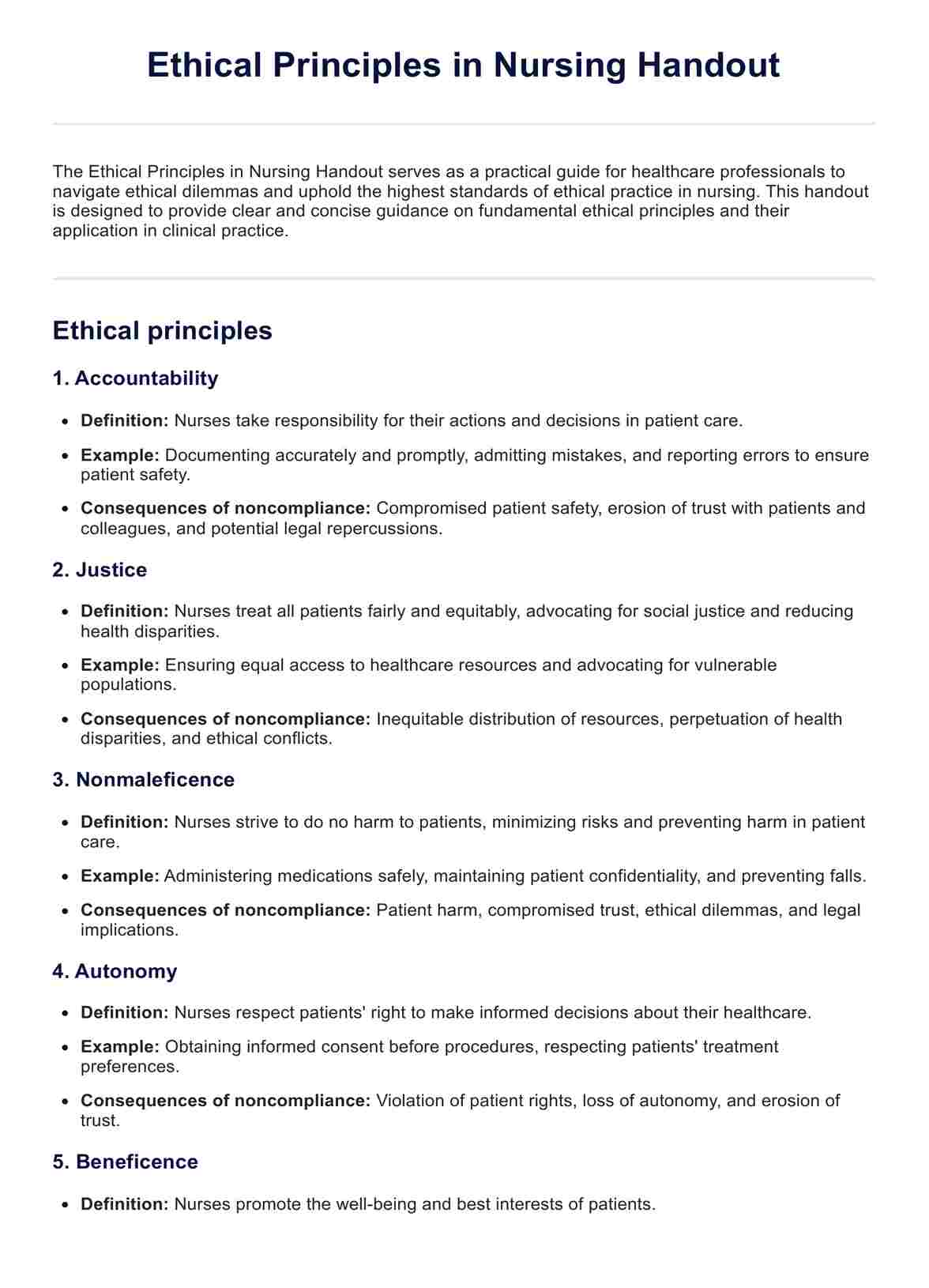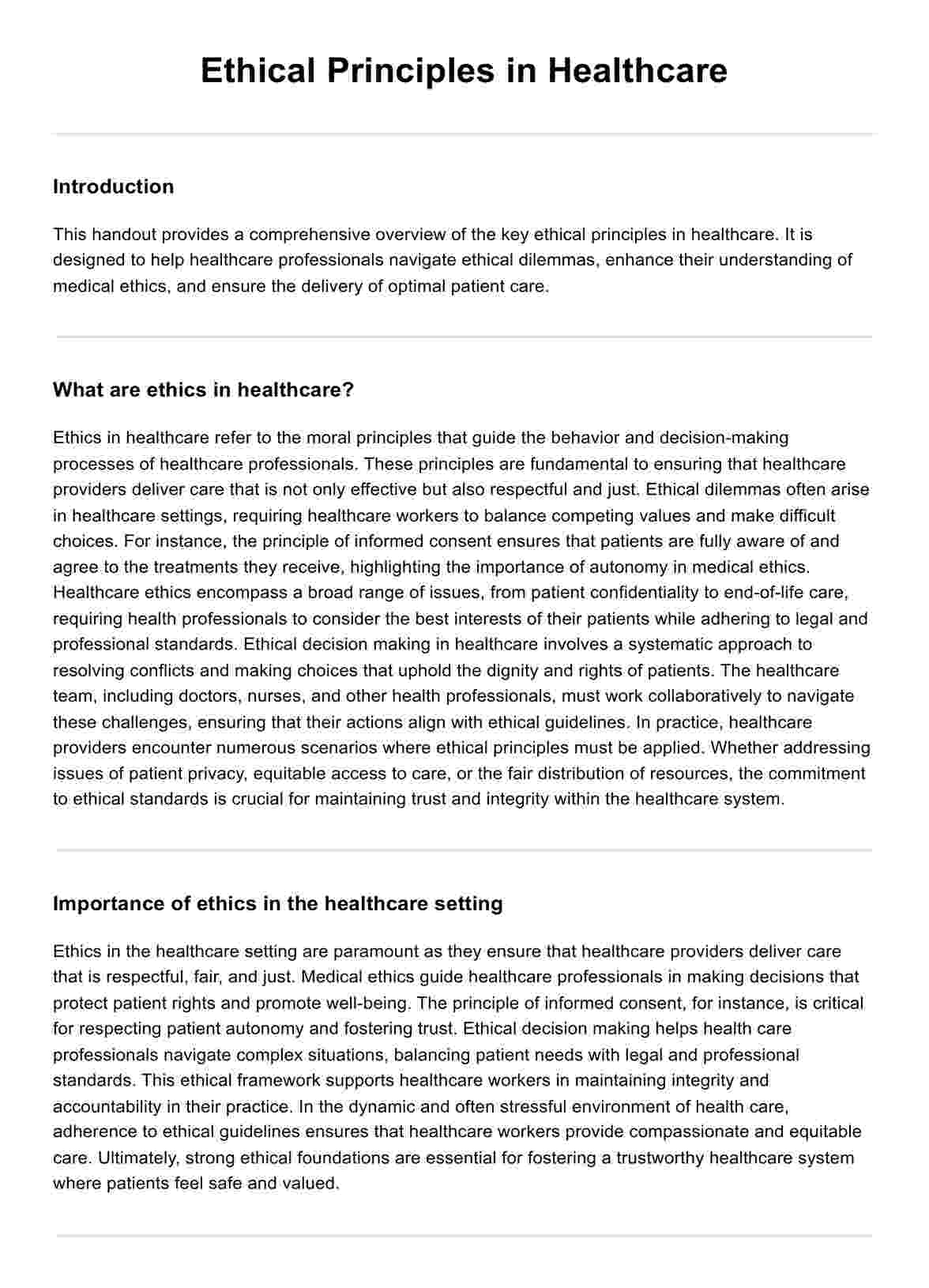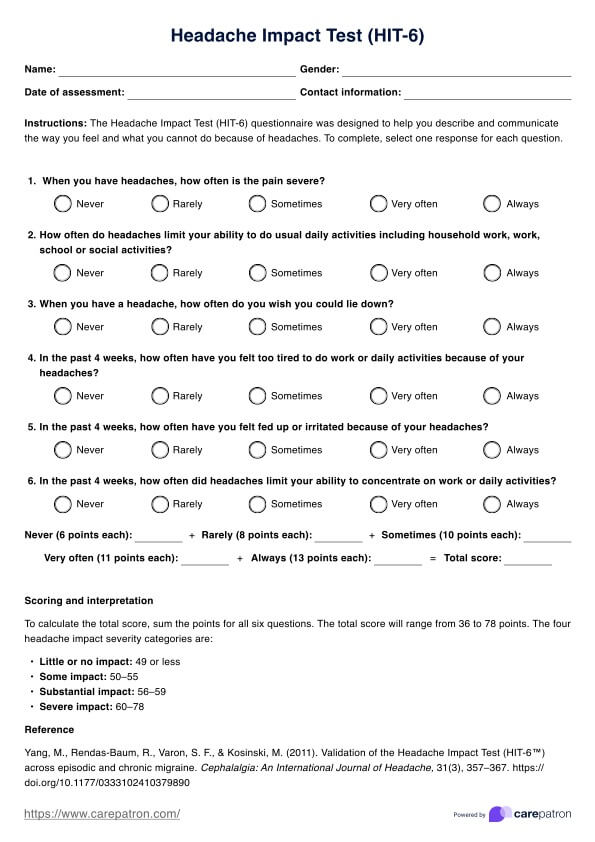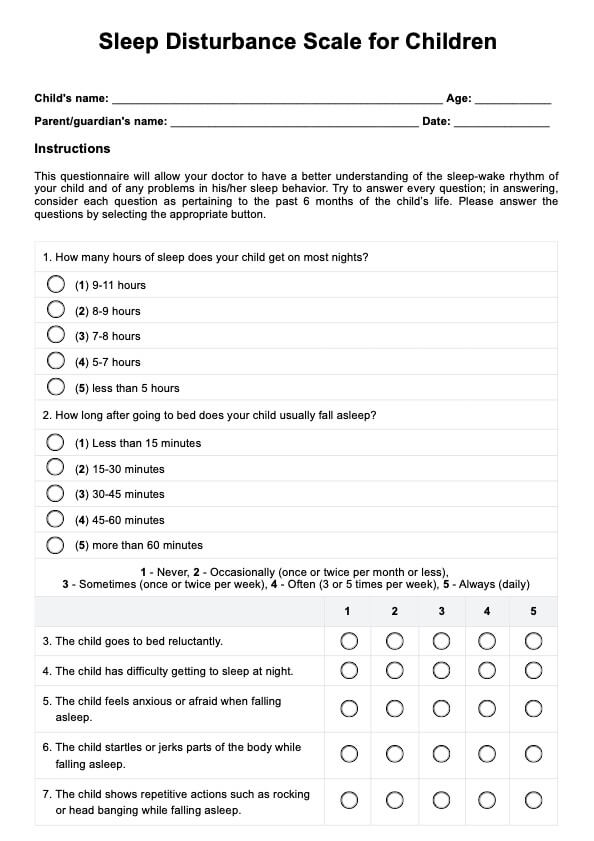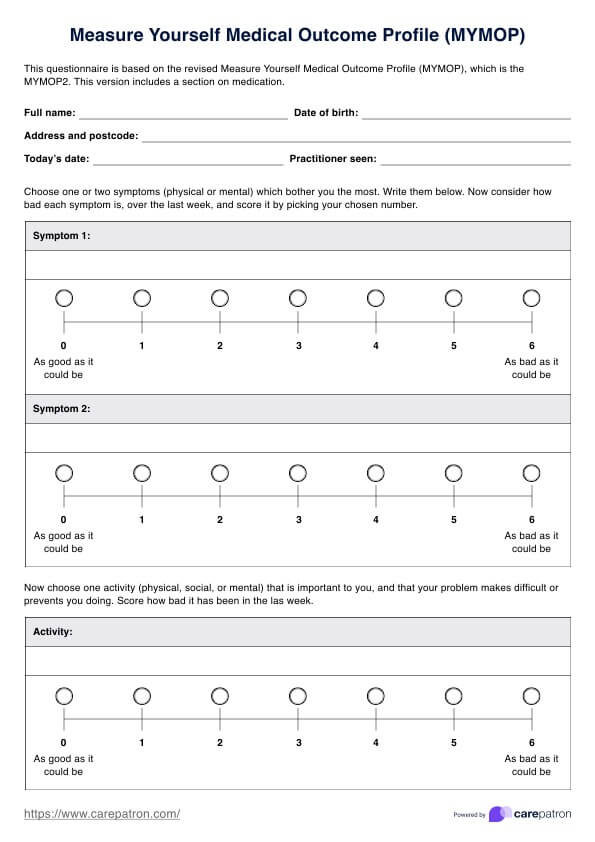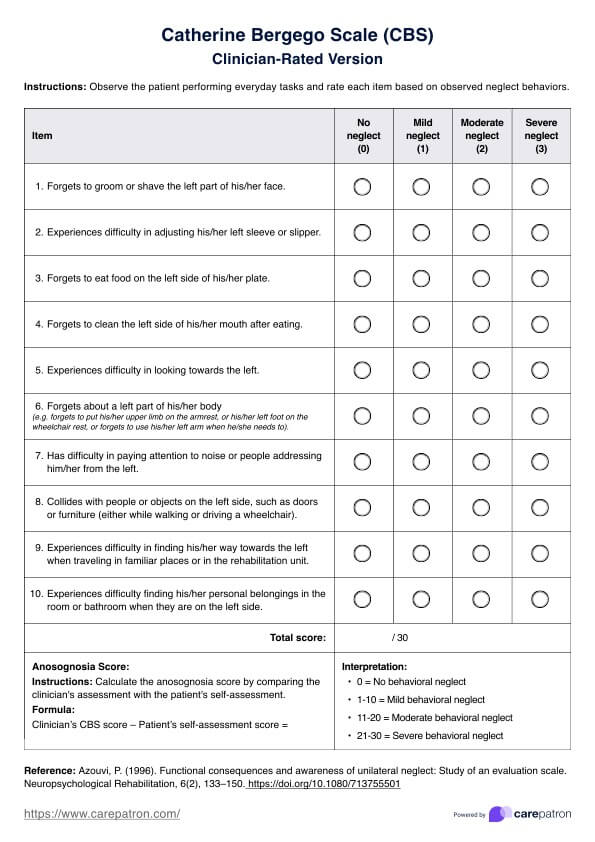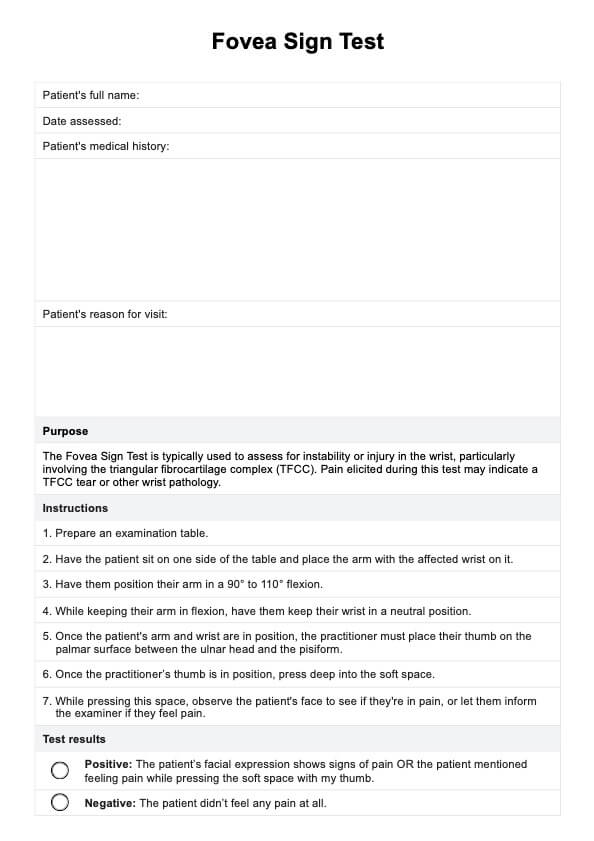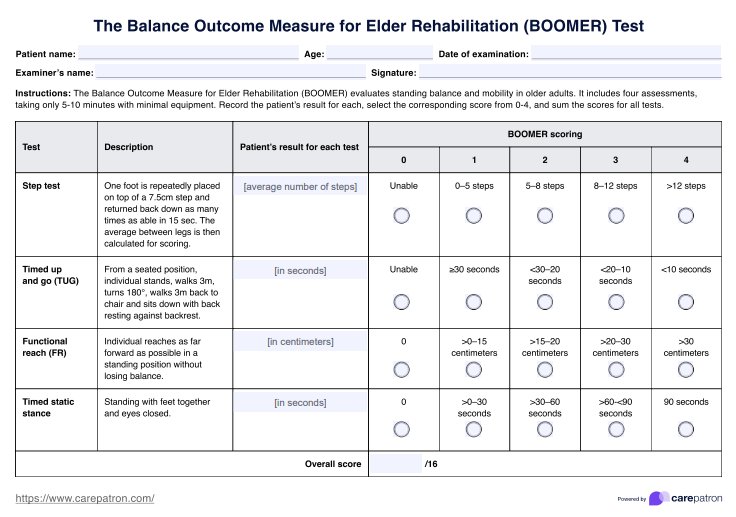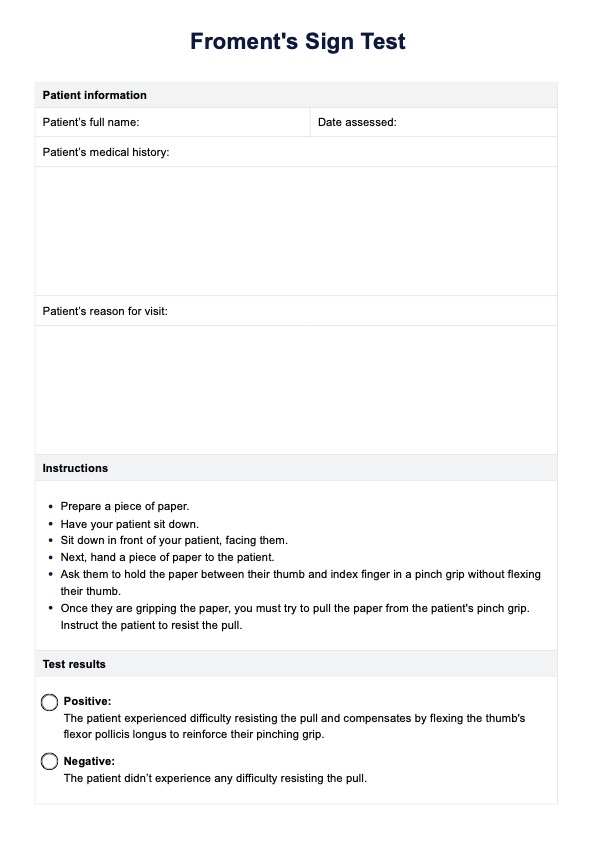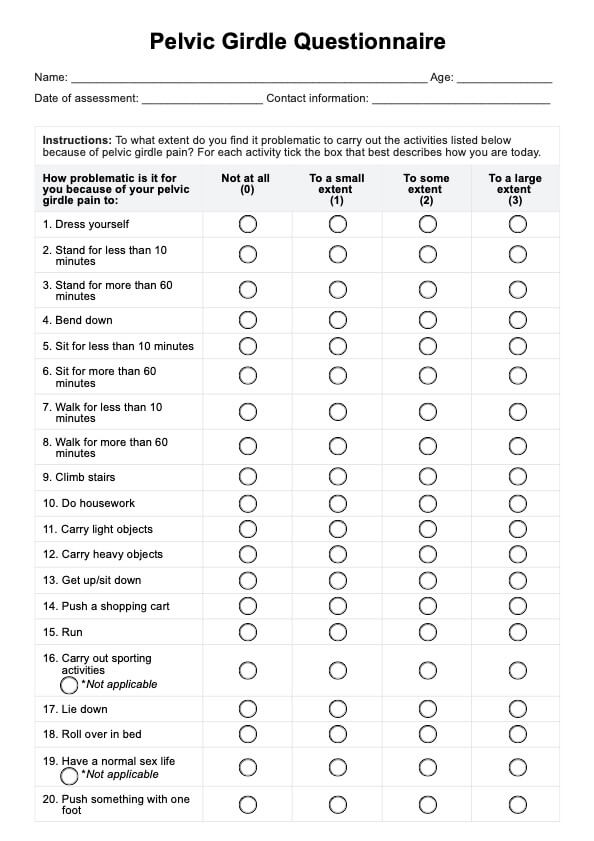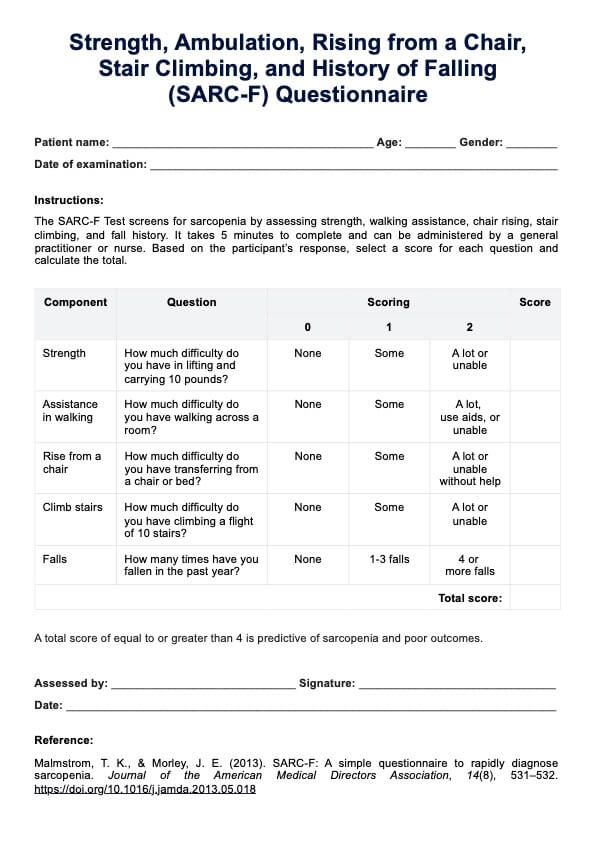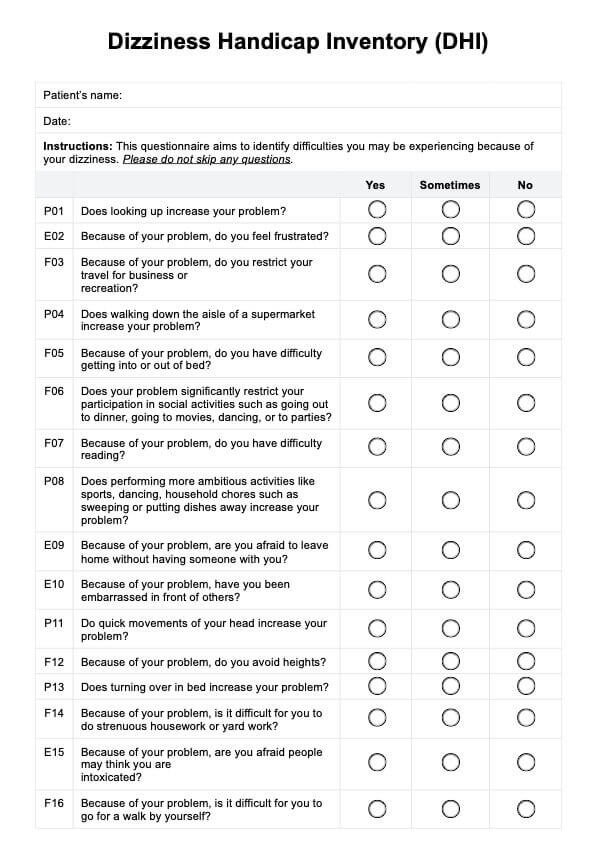Ethical Principles in Nursing
Download Carepatron's free PDF handout on Ethical Principles in Nursing, along with examples to help nurses navigate moral dilemmas in healthcare settings.


The importance of Ethical Principles in Nursing
Ethical principles are the cornerstone of nursing practice, guiding healthcare professionals in navigating complex situations with integrity and compassion. Adherence to ethical guidelines outlined in nursing codes and health policies is paramount within the nursing profession. These principles ensure that the profession can provide optimal patient care that promotes trust and accountability between caregivers and patients.
In ethical nursing principles, upholding patient autonomy and informed consent cannot be overstated. Nurses are tasked with respecting the rights and preferences of individuals under their care, fostering a culture of shared decision-making and mutual respect. Additionally, ethical principles guide nurses in addressing challenging ethical dilemmas that may arise in clinical settings, empowering them to make morally sound decisions in the best interest of their patients.
By embracing ethical practice, nurses uphold their primary commitment to promoting health diplomacy and advancing optimal patient care. This commitment extends beyond individual interactions to encompass broader societal implications, shaping the landscape of healthcare delivery and policymaking. Ultimately, Ethical Principles in Nursing serve as a compass, guiding other health professionals in upholding the highest standards of care and moral conduct.
Ethical Principles in Nursing Template
Ethical Principles in Nursing Example
Seven Ethical Principles in Nursing
In nursing ethics, seven fundamental principles guide the ethical conduct of healthcare professionals. Understanding and applying these principles is essential to fulfilling the nurse's primary commitment to promote health, advocate for patients, and uphold the highest standards of ethical practice.
Accountability
Nurses uphold accountability by taking responsibility for their actions and decisions in patient care. This ethical principle emphasizes the importance of maintaining competence, adhering to standards of practice, and promoting patient safety through individual and collective effort.
Justice
Justice in nursing ethics entails treating all patients fairly and equitably, regardless of socioeconomic status, race, or gender. Nurses advocate for social justice, working to reduce health disparities and ensure access to quality care for all individuals within their communities.
Nonmaleficence
Nonmaleficence emphasizes the nurse's obligation not to harm patients. This ethical principle guides nurses in minimizing risks and preventing harm by providing safe and competent care, maintaining patient confidentiality, and advocating for patients' rights and well-being.
Autonomy
Autonomy recognizes patients' right to make informed decisions about their healthcare. Nurses respect patient independence by providing information, supporting shared decision-making, and advocating for patients' rights to make choices that align with their values and preferences.
Beneficence
Beneficence focuses on promoting the well-being and best interests of patients. Nurses uphold this ethical principle by striving to improve patient outcomes, advocating for access to necessary resources and interventions, and engaging in practices that promote health and healing.
Fidelity
Fidelity underscores the importance of maintaining trust and integrity in the nurse-patient relationship. Nurses demonstrate fidelity by honoring commitments, respecting confidentiality, and acting in the best interests of patients while upholding professional standards of conduct.
Veracity
Veracity emphasizes the importance of truthfulness and honesty in communication with patients. Nurses uphold this ethical principle by providing accurate information, disclosing relevant details about treatment options and potential risks, and fostering open and transparent communication to promote trust and informed decision-making.
What is an Ethical Principles in Nursing Handout?
An Ethical Principles in Nursing Handout is a concise document outlining the foundational values and principles that guide ethical decision-making in nursing practice. It serves as a reference tool for health care professionals to navigate ethical dilemmas and uphold the standards of nursing ethics. Typically, these handouts are based on established frameworks such as the nursing code of ethics set forth by organizations like the American Nurses Association (ANA) and relevant nursing and health policies.
The handout highlights key ethical principles such as accountability, justice, and autonomy, providing nurses with practical guidance on how to apply these principles in their daily practice. Promoting a culture of ethical awareness and accountability, the handout creates an ethical environment within healthcare settings, ultimately enhancing patient care and outcomes.
Additionally, the handout serves as a resource for personal and professional growth, helping nurses align their actions with core articulate nursing values and contribute to promoting health diplomacy within the nursing profession.
Structure
An Ethical Principles in Nursing Handout typically follows a structured format to provide clear and concise guidance on ethical decision-making in nursing practice. Below are the key components commonly found in such handouts:
- Introduction: Provides an overview of the purpose and importance of Ethical Principles in Nursing and healthcare.
- Ethical principles: Outlines the fundamental ethical principles that guide nursing practice, such as accountability, justice, autonomy, beneficence, nonmaleficence, fidelity, and veracity.
- Application guidelines: Offers practical guidelines and examples for applying ethical principles in various clinical scenarios.
- References: Includes citations for relevant nursing codes of ethics, professional guidelines, and policies to support ethical decision-making.
- Additional resources: Provides links or references to further reading materials, workshops, or educational resources on nursing ethics and ethical practice.
- Contact information: Offers contact details for ethics committees, support services, or resources within the healthcare organization for nurses seeking guidance on ethical issues.
This structured approach ensures that nurses have access to essential information and resources to navigate ethical challenges effectively and uphold the highest professional standards development in their daily work.
How to use our Ethical Principles in Nursing Handout template
Medical professionals can effectively utilize Carepatron's Ethical Principles in Nursing Handout template to navigate ethical challenges and promote ethical practice in nursing. Below are the key steps for using the template:
Understand the content
Familiarize yourself with the ethical principles outlined in the handout, including accountability, justice, autonomy, beneficence, nonmaleficence, fidelity, and veracity. Ensure clarity on how each principle applies to your nursing practices.
Apply toclinical scenarios
Apply the ethical principles from the handout to real-life clinical scenarios encountered in your practice. Consider how each principle guides decision-making and influences patient care outcomes.
Adapt to organizational policies
Tailor the Ethical Principles in Nursing Handout template to align with your healthcare organization's specific policies and guidelines. Incorporate relevant references and resources to support ethical decision-making within your organizational context.
Integrate into professional development
Integrate the handout template into ongoing professional development activities, such as ethics workshops, seminars, or team discussions. Continuously reinforce the importance of ethical practice and ethical decision-making among health care professionals.
Feedback and revise
Seek feedback from colleagues, mentors, or ethics committees on the effectiveness of the Ethical Principles in Nursing Handout template. Make necessary revisions based on input received to ensure its relevance and applicability in diverse clinical settings.
How nurses can benefit from this handout
Nurses can benefit from utilizing the Ethical Principles in Nursing Handout as a practical resource to guide their practice and decision-making.
Enhanced ethical awareness
The handout facilitates a deeper understanding of ethical principles outlined in the nursing code and health policies established by organizations such as the ANA. By familiarizing themselves with these principles, nurses can confidently enhance their ethical awareness and navigate complex ethical dilemmas.
Improved patient care
By adhering to ethical principles outlined in the handout, nurses can promote high-quality care and ensure patient safety. Applying principles such as beneficence and nonmaleficence; nurses can advocate for optimal patient outcomes and prioritize the well-being of those under their care.
Promotion of professionalism
Utilizing the handout demonstrates a commitment to professionalism and ethical practice among registered nurses. By upholding ethical principles in their daily practice, nurses promote health diplomacy and foster a culture of trust and integrity within nursing care settings.
Guidance in ethical decision-making
The handout is a practical guide for nurses facing ethical dilemmas in clinical practice. The handout empowers nurses to make informed and ethically sound decisions that align with their professional values and obligations by providing straightforward examples and application guidelines.
Alignment with organizational policies
Nurses can use the handout to ensure alignment with organizational policies and guidelines related to ethical practice. Nurses can demonstrate adherence to professional standards and promote consistency in ethical decision-making across healthcare settings.
Consequences of violating nursing ethical principles
Violating nurse ethical principles can have significant repercussions on patient care, professional integrity, and the overall reputation of the nursing profession. Nurses must understand these consequences to uphold their ethical obligations and provide high-quality care.
Compromised patient care
When nurses fail to adhere to ethical principles, patient care may suffer. Violations of principles such as benevolence and nonmaleficence can result in suboptimal care, patient harm, and compromised health outcomes.
Erosion of professional integrity
Violating ethical principles undermines the integrity and credibility of the nursing profession. Nurses are responsible for upholding professional standards and articulating nursing values in their practice. Ethical breaches can tarnish the reputation of individual nurses and the profession.
Legal and ethical repercussions
Nurses who violate ethical principles may face legal and moral repercussions, including disciplinary action, loss of licensure, and litigation. Ethical concerns such as breach of patient confidentiality or failure to obtain informed consent can lead to legal liability and damage to professional reputation.
Diminished trust and credibility
Violating nursing ethical principles erodes trust between nurses, patients, and healthcare teams. Patients rely on nurses to provide optimal care and act in their best interests. Ethical breaches can damage trust and undermine the nurse-patient relationship, impacting the quality of care and patient satisfaction.
Negative impact on quality health care
Ethical violations contribute to a negative culture within healthcare settings and impede efforts to provide quality health care. Nurses play a crucial role in promoting ethical practice and ensuring safe, effective, and compassionate care. Violations of core moral principles can hinder professional collaboration and teamwork, leading to fragmented care and diminished patient outcomes.
Commonly asked questions
Ethical Principles in Nursing are essential for maintaining patient trust, ensuring quality care, and upholding professional integrity. They provide a framework for ethical decision-making, guiding nurses in navigating complex situations and promoting patient well-being.
The seven Ethical Principles in Nursing include accountability, justice, nonmaleficence, autonomy, beneficence, fidelity, and veracity. These principles guide nurses in upholding ethical standards, respecting patient rights, and promoting optimal care outcomes.
Failure to follow Ethical Principles in Nursing can lead to compromised patient care, erosion of trust between patients and healthcare providers, and legal repercussions. Ethical breaches may result in harm to patients, damage to professional reputation, and disciplinary action against healthcare professionals.


